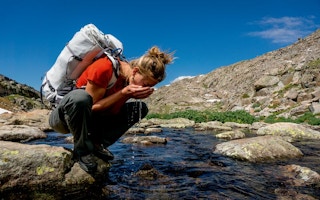The prominent American environmentalist David Brower once said, “There is no business to be done on a dead planet.” As businesses, we all share an urgent imperative to work together to help reverse the steep decline in the environmental health of our planet.
To continue reading, subscribe to Eco‑Business.
There's something for everyone. We offer a range of subscription plans.
- Access our stories and receive our Insights Weekly newsletter with the free EB Member plan.
- Unlock unlimited access to our content and archive with EB Circle.
- Publish your content with EB Premium.
As a first step, the environmental funding paradigm is out of balance and we need to work together to change it.
In the conventional model of philanthropy, the big funders—corporations and foundations—mainly support big professional environmental groups. It goes without saying that these large organisations (those with budgets over $5 million) are doing important work, but what many people don’t realise is, they make up just 2 per cent of all environmental groups, yet receive more than 50 per cent of all environmental grants and donations, according to a report by the National Committee for Responsive Philanthropy.
Funding the environmental movement at a grassroots level and supporting smaller, under-funded, under-resourced organisations has never been more critical. It is through this connection to community-based organisations that businesses can have the most impact in raising complicated and critical issues in the public mind and where we will see real change happen.
That’s why Patagonia pays a voluntary ‘Earth Tax’ – giving 1 per cent of our sales each year, whether it’s a good year for business or not, to grassroots, community-based environmental organisations that are working to create positive change for the planet in their own backyard.
At Patagonia, we’ve given more than $USD 70 million since 1985 through this commitment – funding that has facilitated important work at the local level to restore rivers and forests, stop mines, protect endangered wildlife and habitat, and mitigate the effects of climate change. This year, we donated $6.2 million to 741 different grassroots environmental groups in 18 countries worldwide.
In Australia, we were proud to support the Australian Marine Conservation Society, the Bob Brown Foundation, the Clean Coast Collective, the Climate Council of Australia, the Mackay Conservation Group, Market Forces, the North Queensland Conservation Council, Solar Citizens and Take 3.
As revealed by the 2015 Cone Communications/Ebiquity Global CSR study consumers, more than ever before, have a higher level of understanding, awareness and personal accountability to address social and environmental issues.
Not surprisingly, these discerning audiences have increasingly high demands for companies to drive change and progress in addressing these issues.
“
No matter how diligent a company is, there’s no denying it causes waste and pollution and businesses are fundamentally responsible to their resource base.
It’s important that once you learn the environmental costs of a business you to try to reduce them. And when you can reduce them, you must. At Patagonia, a detailed environmental assessment of our fabrics 15 years ago told us that conventionally grown cotton was the most damaging to the environment; using 25 per cent of all insecticides. Since learning this, we developed new infrastructure, from farmers to ginners to spinners to knitters and weavers, and made the shift from conventionally grown cotton to organic cotton in our products. Organic farming is more time consuming, requires more knowledge and skill, and, for now, costs more. But it’s worth it. We’re working to be more socially responsible by taking small, positive steps in the right direction.
No matter how diligent a company is, there’s no denying it causes waste and pollution and businesses are fundamentally responsible to their resource base.
Since the introduction of the Earth Tax, we’ve co-founded 1% for the Planet as a network to drive the movement. 1% for the Planet is an alliance of businesses that contribute at least one per cent of their net annual sales to groups on a list of researched and approved environmental organisations.
The network understands the necessity of protecting the natural environment, and by encouraging other business to take part, presents them with an easy way to give back. It is through building an alliance between businesses and centralising our efforts to implement solutions to the environmental crisis that we will be most effective in initiating significant and lasting change.
By sharing our experiences, learnings and business models we’re encouraging other businesses to get on board the 1 per cent for the Planet and take a collaborative approach to solving the environmental crisis.
As we progress into an era where consumers increasingly demand companies to act responsibly and take a proactive approach to addressing social and environmental issues, it is vital that we are collaborative and unified in our approach. This is the only way we will incite real and meaningful change on a wider scale.
Dane O’Shanassy is Australia and New Zealand general manager, Patagonia. This article was written exclusively for Eco-Business.


















